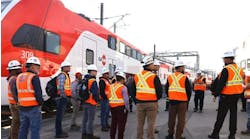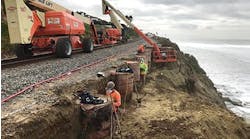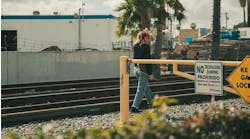San Francisco and the Consulate General of the Netherlands, in coordination with the San Francisco Municipal Transportation Agency (SFMTA) and the San Francisco Bike Coalition (SFBC), kicked off the ThinkBike workshops to bring Dutch bicycle transportation experts together with San Francisco transportation planners, engineers and bicycle advocates to plan and discuss how the city can become more bike-friendly. While San Francisco leads among major U.S. cities in terms bike-ridership, the city continues to seek ways to improve its transportation infrastructure and keep pace with the demand for bicycling facilities.
"I am pleased to welcome ThinkBike and thank the Consulate General of the Netherlands for his commitment and leadership in showcasing here the projects and policies to promote bicycling," said Mayor Edwin M. Lee. "Whether commuting to work, running errands or taking family outings, more and more San Franciscans are choosing to bicycle. I know the SFMTA, SFBC and other participants will make the most of this opportunity to make bicycling in San Francisco easier and safer."
"Thank you, San Francisco, for welcoming our team of experts. We are happy to share the Dutch experience to make San Francisco an even better, thriving and biking city," said Bart von Bolhuis, Dutch Consul General. "The Consulate is pleased to be part of this event that highlights the long-standing friendship and further strengthens the great relationship between the U.S. and the Netherlands."
"San Francisco continues to see an increase in bicycling. Even during the injunction bicycle trips increased 58 percent," said Tom Nolan, chairman of the SFMTA board of directors. "As part of the city's Bike Plan, which supports and encourages this growth, the SFMTA continues to add mile after mile of bike lane, implement innovative projects such as the green bike boxes, and work closely with businesses and neighborhoods to help them bring bicycle facilities to their doorsteps."
"We know that improvements to San Francisco's bike network encourage bicycling citywide," said Edward D. Reiskin, SFMTA director of transportation. "The SFMTA bike staff has been hard at work installing the bike network and innovative treatments throughout San Francisco. We look forward to collaborating with our Dutch colleagues and city partners on creative solutions to help keep the number of bicyclists growing in the years ahead."
"We welcome the Dutch to our city and look forward to working with local and Dutch experts to re-imagine San Francisco streets as even greater places to bicycle, live and do business," said Leah Shahum, executive director of the San Francisco Bicycle Coalition, who spent 8 months last year enjoying the Dutch bicycle environment. "The Netherlands has set an extraordinary example of well-planned, urban bicycle infrastructure. We look forward to their help in achieving San Francisco's official goal of 20 percent of trips by bicycle by 2020, and welcoming people from ages 8-to-80 enjoy bicycling on our city streets."
Government officials, community organizations and other decision makers have been invited to learn more about Dutch cycling infrastructure and best policy practices. The opening session, which is open to the public, takes place on Monday, Sept. 19 from 9 to 11 a.m. at City Hall. The workshops will close with a presentation and reception on Tuesday, Sept. 20 from 6 to 8 p.m. at the War Memorial Veterans Building.
Following the opening session two teams consisting of San Francisco transportation planners, advocates, community members, representatives from SFPD and other city departments and the Dutch transportation specialists will survey three study areas and discuss how streets, intersections and neighborhoods can be improved for optimal bike use. The following day, the teams will present their recommendations at the closing session. Other topics of discussion will include bike safety, commuting by bike, biking to school, bike parking, bikes and public transport, and law enforcement.
ThinkBike Study Areas
The three targeted study areas, Market Street between 9th and 5th streets; Polk Street between Broadway and Union Street; and "The Wiggle" route between Scott and Fell streets and Church and Duboce streets were chosen because of particular features that present design challenges.
Market Street
The selected section of Market Street is part of a bike route but lacks designated bike lanes due to the constrained right-of-way. While overall non-transit vehicular traffic volumes are relatively low on Market Street, the cross streets, which intersect it at various angles, carry a great deal of traffic as they connect commercial and employment centers to the freeways.
Polk Street
The northern section of Polk Street is a busy neighborhood commercial corridor with only one lane of traffic in each direction and parking on both sides of the street. This study will seek to determine if a separated bicycle facility would be possible that will not be blocked by double-parked vehicles, delivery vehicles or conflict with pedestrians.
"The Wiggle"
This mile-long route winds through residential and commercial neighborhoods to minimize hilly inclines for bicyclists. It was selected because, while it is wildly popular with bicyclists and makes a great connection from the west side of town to downtown, there is a desire to reduce cut-through vehicle traffic, improve traffic control and turns for bicyclists and increase bicyclists yielding to pedestrians.
The ThinkBike workshops represent an opportunity to bring a fresh approach to the San Francisco bicycling infrastructure and further the primary goal of the city's Bike Plan, expanding the bicycle network. As a key component of the city's Transit First policy as well as the city's Climate Action Plan, increasing bicycling will reduce San Francisco's reliance on private automobiles and further the city's goal of reducing greenhouse gas emissions to 20 percent below 1990 levels by the year 2012. Redesigning streets along the bicycle route network so that they are more inviting to bicyclists will be one of the key ways that San Francisco can attract more people to ride bicycles for their everyday transportation needs. Improved streets and pathways, coupled with high-quality bicycle parking, along with a continued focus on education, encouragement and enforcement, will help San Francisco become a world-class city for bicycling.
The Netherlands is a country committed to sustainability, where nearly 30 percent of trips up to five miles in distance are made by bike. A strong bike policy is integral to Dutch sustainability measures. Through a multi-city initiative, Dutch experts and companies are helping to increase bicycle use in the United States and Canada. ThinkBike workshops have also been held in Toronto, Chicago, Washington D.C. and Miami.
The SFMTA's bicycle program does much more than create bike lanes. The program supports bicycle education for adults and youth, installs bike racks at popular destinations and central locations, identifies locations for better signs, improves off-street trails, and provides outreach—including safety gear and information (such as maps)—to encourage safe and courteous bicycling.
As part of the SFMTA's balanced approach to transportation in San Francisco, the bicycle program, which oversees the Bicycle Plan, ensures education and safety for cyclists, pedestrians, and motorists. More information on the San Francisco Bicycle Plan, including specific projects, can be found at www.sfmta.com/bikes.


